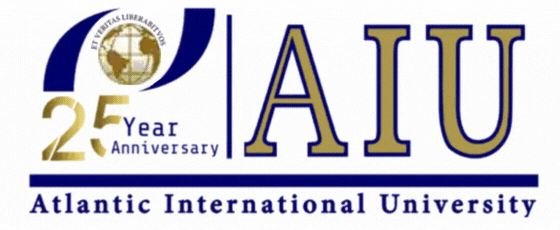- RESEARCHDistance Learning at AIU is enhanced by vast academic resources and innovative technologies build into the Virtual Campus: Hundreds of self-paced courses with video lectures and step by step lessons, thousands of optional assignments, 140,000 e-books, the Social Media & Networking platform allowing collaboration/chat/communications between students, and MYAIU develop students holistically in 11 areas beyond just academics.
- PROGRAMS OFFERED
- Areas of Study
- Courses and Curriculum
- Open Courses
- Register for a Program
- Associate Program
- Associate in Addiction Counseling
- Associate in Agriculture Food And Resources
- Associate in Anti Terrorism Security
- Associate in Behavior Analysis In Special Education
- Associate in Bioethics
- Associate in Climatology
- Associate in Cultural Theological Communication
- Associate in Culinary Arts
- Associate in Ecotechnology
- View all Associates Programs
- Bachelor Program
- Bachelors in Community Development
- Bachelors in Environmental Science
- Bachelor in Education (B.Ed, BS)
- Bachelors in Economics
- Bachelors in Entrepreneurship
- Bachelors in Financial Administration
- Bachelors in Human Resource Management
- Bachelors in Linguistics
- Bachelors in Nutritional Science
- Bachelors in Occupational Health and Safety
- Bachelors in Psychology
- View all Bachelor Programs
- Doctorate Program
- Doctor | of Biology (PhD)
- Doctorate in Business Administration (DBA, PhD)
- Doctor of Economics (PhD)
- Doctor of Electrical Engineering (D.Sc, PhD)
- Doctor of Finance (PhD)
- Doctorate in International Relations
- Doctorate in Information Technology (D.Sc)
- Doctor of Legal Studies (PhD)
- Doctor of Project Management (PhD)
- Doctor of Sociology (PhD, D.Sc)
- Doctorate in Sustainable Natural Resources Management
- View all Doctorate Programs
- Master Program
- Postdoctoral Program
- Postdoctoral in Animal Science
- Postdoctoral in Anti Terrorism Security
- Postdoctoral in Behavior Analysis In Special Education
- Postdoctoral in Bioethics
- Postdoctoral in Blockchain Technology and Digital Currency
- Postdoctoral in Business Management
- Postdoctoral in Cloud Computing
- Postdoctoral in Computer Engineering
- View all Postdoctoral Programs
AIU offers a wide range of majors in areas including the Arts, Business, Science, Technology, Social, and Human studies. More than 120 degrees and programs are available for adult learners at the associate’s, bachelor’s, master’s, doctoral and postdoctoral level. - VIRTUAL CAMPUS
Distance Learning at AIU is enhanced by vast academic resources and innovative technologies build into the Virtual Campus: Hundreds of self-paced courses with video lectures and step by step lessons, thousands of optional assignments, 140,000 e-books, the Social Media & Networking platform allowing collaboration/chat/communications between students, and MYAIU develop students holistically in 11 areas beyond just academics.
- ALUMNI
The world is YOUR campus!”, that is the message of AIU’s month magazine Campus Mundi. Hear the voices and see the faces that make up AIU. Campus Mundi brings the world of AIU to you every months with inspirational stories, news and achievements by AIU members from around the world (students and staff are located in over 200 countries).
Advanced Information Literacy
Empowering Through Information Literacy: Navigating the Digital Age
The document explores the significance of information literacy in the digital age, highlighting its role in academic success, professional development, and civic engagement. It emphasizes the need for critical thinking, ethical information use, and the challenges individuals face in acquiring these skills, while proposing strategies to enhance information literacy.

The document discusses the critical importance of information literacy in today’s digital landscape, where vast amounts of information are readily available, much of which can be misleading or unverified. It defines information literacy as the ability to identify, locate, evaluate, and effectively use information, which is essential for academic success, professional development, and informed civic participation.
The text emphasizes that strong information literacy skills enable students to engage with complex materials, conduct meaningful research, and produce informed academic work. However, it also acknowledges the challenges posed by the overwhelming volume of information, the varying quality of sources, and the lack of guidance that can hinder students from fully developing these skills. In an era where misinformation spreads rapidly, robust information literacy is deemed crucial for both academic achievement and critical thinking.
Ethical considerations surrounding information literacy are also highlighted, including issues such as plagiarism, intellectual property rights, and the use of biased or misleading sources. The document stresses the importance of understanding the ethical implications of information use, including giving credit to original authors and respecting copyright laws. It advocates for training students to discern credible information from biased perspectives to maintain the integrity of their academic work.
Furthermore, the document explores the role of information literacy in fostering critical thinking. It encourages individuals to analyze and synthesize diverse information sources, question the reliability of those sources, and identify biases. This skill set not only enhances academic performance but also prepares individuals to tackle real-world problems that require nuanced thinking.
The text also addresses the digital divide, which presents significant challenges to information literacy by creating unequal access to technology and information resources across different socioeconomic groups. It suggests that increasing access to digital tools, providing community resources, and implementing educational programs focused on information literacy can help bridge this gap.
In addition, the document discusses the evolving nature of information literacy in the context of advancements in artificial intelligence and machine learning. While technology can facilitate information retrieval and analysis, it also poses risks such as the spread of misinformation and algorithmic bias. Therefore, information literacy education must adapt to incorporate these emerging technologies and prepare individuals to navigate the complexities of an AI-driven information landscape.
Overall, the document underscores the necessity of information literacy in the modern world, advocating for its integration into educational curricula and professional development programs to empower individuals to make informed decisions and contribute positively to society.
Atlantic International University
Get to know the AIU experience
Contact Us Today!
We understand how busy adults do not have time to go back to school. Now, it’s possible to earn your degree in the comfort of your own home and still have time for yourself and your family. The Admissions office is here to help you, for additional information or to see if you qualify for admissions please contact us. If you are ready to apply please submit your Online Application and paste your resume and any additional comments/questions in the area provided.
Pioneer Plaza
900 Fort Street Mall 905
Honolulu, HI 96813
800-993-0066 (Toll Free in US)
808-924-9567 (Internationally)
808-947-2488 (Fax)
AIU Success Stories







Contact Us Today!
Begin Your Journey!
AIU’s Summer of Innovation and Growth gives you the ability to earn up to $5000 in tuition credit by completing free lessons and courses.
Whether you’re looking to acquire new skills, advance your career, or simply explore new interests, AIU is your gateway to a world of opportunities. With free access to 3400 lessons and hundreds of courses the ability to earn credits and earn certificates there’s no better time to start learning.
Join us today as a Guest Student and take the first step towards a brighter, more empowered future.
Explore. Learn. Achieve.
Degrees

Contact Us
Atlantic International University
900 Fort Street Mall 905 Honolulu, HI 96813 [email protected]
Quick Links
Home | Online Courses | Available Courses | Virtual Campus | Career Center | Available Positions | Ask Career Coach | The Job Interview | Resume Writing | Accreditation | Areas of Study | Bachelor Degree Programs | Masters Degree Programs | Doctoral Degree Programs | Course & Curriculum | Human Rights | Online Library | Representations | Student Publication | Sponsors | General Information | Mission & Vision | School of Business and Economics | School of Science and Engineering | School of Social and Human Studies | Media Center | Admission Requirements | Apply Online | Tuition | Faculty & Staff | Distance Learning Overview | Student Testimonials | AIU Blogs | Register for Program | Privacy Policy | FAQ



















